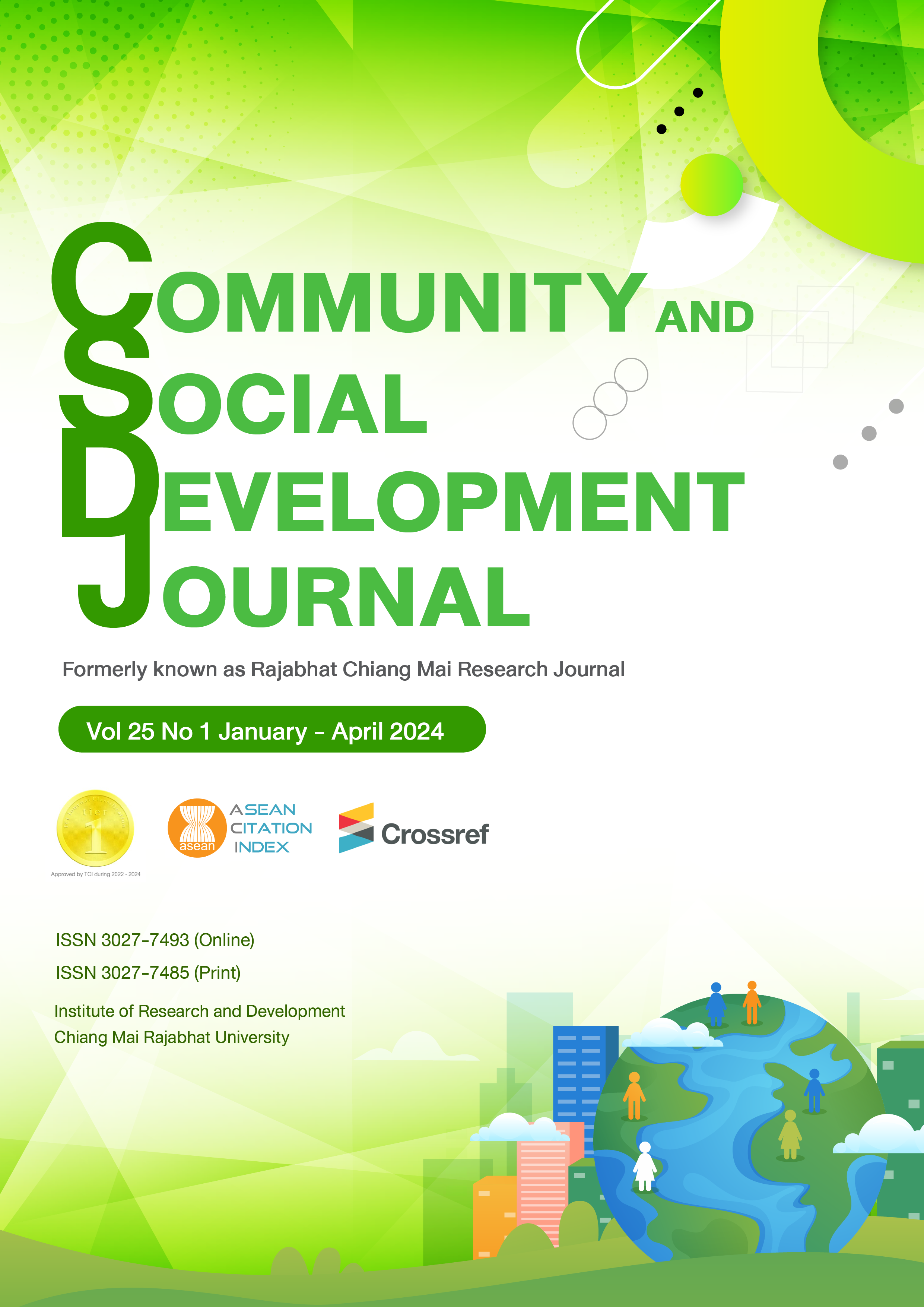Model of Buddhism-Based Learning to Enhance the Compassionate Mind of Higher Education Students
DOI:
https://doi.org/10.57260/rcmrj.2024.264481Keywords:
Learning, Buddhism-based learning, Enhance the compassionate mind, Higher education students, Students activitiesAbstract
The purposes of this research were: to synthesize elements and indicators of the compassionate mind of higher education students, to develop a model of Buddhism-based learning to enhance the compassionate mind of higher education students; and to study the implementation results of a model of Buddhism-based learning to enhance the compassionate mind of higher education students. Key informants were selected by purposive sampling. The instruments used were: a semi-structured interview form which data were analyzed through content analysis and summarized into issues, a model verifying form which the data were analyzed using frequency and percentage; and a satisfaction form and model evaluation form which the data were analyzed by mean and standard deviation. The research results showed that the results of synthesizing elements and indicators of the compassionate mind of higher education students consisted of five preliminary elements and twenty-one indicators, a complete model of Buddhism-based learning to enhance the compassionate mind of higher education students was POO(LLOTUSS)D, the accuracy and suitability of this model were at the highest level; and results of studying the implementation results of a model of Buddhism-based learning to enhance the compassionate mind of higher education students were overall at the highest level.
Downloads
References
Adams, N. M., & Kecskes, K. (2020). The Long-Haul: Buddhist educational strategies to strengthen students’ resilience for lifelong personal transformation and positive community change. Metropolitan Universities, 31(3), 140-162. DOI:10.18060/23997
Areekul, C. (2020). The development of being a professional teacher in the 21st century model is based on the ethics of the profession with Buddhism integration. New Trends and Issues Proceedings on Humanities and Social Sciences, 7(1), 39-46. DOI:10.18844/prosoc.v7i1.4866
BBC. (2022). Buddhist beliefs. Retrieved from https://www.bbc.co.uk/bitesize/guides/zf8g4qt/revision/7
Cherry, K. (2021). What is compassion? Retrieved from https://www.verywellmind.com/what-is-compassion-5207366
Gilbert, P. (2010). An introduction to the theory & practice of compassion focused therapy and compassionate mind training for shame based difficulties: The compassionate mind foundation. Retrieved from http://www.Compassionatemind.co.uk/downloads/training_materials/1.Workbook2010.pdf
Gilbert, P. (2017). Compassion: Concept, research and applications. New York: Routledge.
Gilbert, P., & Procter, S. (2006). Compassionate mind training for people with high shame and self-criticism: Overview and pilot study of a group therapy Approach. Clinical Psychology & Psychotherapy, 13(6), 353–379. DOI:10.1002/cpp.507
Kassor, C. (2018). The discomfort of compassion. Retrieved from https://tricycle.org/article/discomfort-compassion/
Khanh, L. Q., & Thi Thuy, P. (2020). An inquiry into Vietnam Buddhist higher education system with special reference to Vietnam Buddhist University in Hue. The Journal of International Association of Buddhist Universities (JIABU), 12(2), 14–26. Retrieved from https://so06.tci-thaijo.org/index.php/Jiabu/article/view/219882
Lai, Q. K., & Pham, T. T. V. (2019). Loving-kindness and compassion in Buddhism and moral education for young adults: A case study in Vietnam. Proceedings of 15th International Conference on Humanities and Social Sciences 2019 (IC-HUSO 2019). Khon Kaen University. Retrieved from https://hs.kku.ac.th/ichuso/2019/096-ICHUSO-2019-N.pdf
Royal Thai Government Gazette. (2023). Student loan fund act (No. 2) B.E. 2566. Retrieved From https://www.studentloan.or.th/th/system/files/files/knowledge/140A020N0000000001400.pdf
Sangsri, J. (2019). A study of unity in Buddhism. The Journal of The International Buddhist Studies College (JIBSC), 4(1), 1-9. Retrieved from https://so03.tci-thaijo.org/index.php/ibsc/article/download/208945/144835/654091
Muangkaew, K. (2023). Elements of compassionate mind of higher education. Proceeding of Education and Learning Innovation for the Post-Pandemic Era and the Future (ICE 2023), 198-210. Silapakorn University. Retrieved from https://drive.google.com/drive/folders/1su9sOlqK-ZoXl4FhO8Q3et6paoSq1H75
Singh, A. K. (2018). Empowering youth through Buddhist education. The Journal of International Association of Buddhist Universities (JIABU), 11(3), 298–310. Retrieved from https://so06.tci-thaijo.org/index.php/Jiabu/article/view/219240/151781
Strauss, C., Taylor, B. C., Gu, J., Kuyken, W., Ruth, B. R., Jones, F., & Cavanagh, K. (2016). What is compassion and how can we measure it? A review of definitions and measures. Clinical Psychology Review, 47, 15-27. Retrieved from https://doi.org/10.1016/j.cpr.2016.05.004
Tolonen, I., Saarinen, A., Keltikangas-Järvinen, L., Siira, V., Kähönen, M., & Hintsanen, M. (2021). Rewards of compassion: Dispositional compassion predicts lower job strain and effort-reward imbalance over a 11-year follow-up. Front. Psychol, 12. 1-12. Retrieved from https://doi.org/10.3389/fpsyg.2021.730188
Thairath Online. (2018). The student loans fund does not reach the hands of the poor. Worried that bad debt will escalate More than half of the debt is distorted. Retrieved from https://www.thairath.co.th/money/economics/thailandecon/1344033
Thero, V. K. B. (2018). Empowering youth through Buddhist education. The Journal of International Association of Buddhist Universities (JIABU), 11(3), 393–400. Retrieved from https://so06.tci-thaijo.org/index.php/Jiabu/article/view/219842
Watanachai, K. (2016). Moral school: Help create good people for the society. (8th ed.). Nonthaburi: Thanatat Printing Company Limited.
World Health Organization (WHO). (2021). Mental health of adolescents. Retrieved from https://www.who.int/news-room/fact-sheets/detail/adolescent-mental-health
Yeamyeuan, A., & Uansa-ard, S. (2022). The causal factor of psychological characteristics and situation of volunteer behavior of Thai youth. Rajabhat Chiang Mai Research Journal, 23(1), 76–93. DOI:10.14456/rcmrj.2022.250581
Downloads
Published
How to Cite
Issue
Section
License
Copyright (c) 2024 Community and Social Development Journal : CSDJ Formerly khows as Rajabhat Chiang Mai Research Journal

This work is licensed under a Creative Commons Attribution-NonCommercial-NoDerivatives 4.0 International License.
1. Articles, information, content, images, etc published in the “Community and Social Development Journal” are copyrighted by the Community and Social Development Journal, Chiang Mai Rajabhat University. In order to properly distribute the articles through print and electronic media, the authors still hold the copyright for the published articles under the Creative Commons Attribution (CC BY) license, which allows the re-distribution of the articles in other sources. References must be made to the articles in the journal. The authors are responsible for requesting permission to reproduce copyrighted content from other sources.
2. The content of the articles appearing in the journal is the direct responsibility of the article authors. The editorial board of the journal does not necessarily agree with or share any responsibility.














